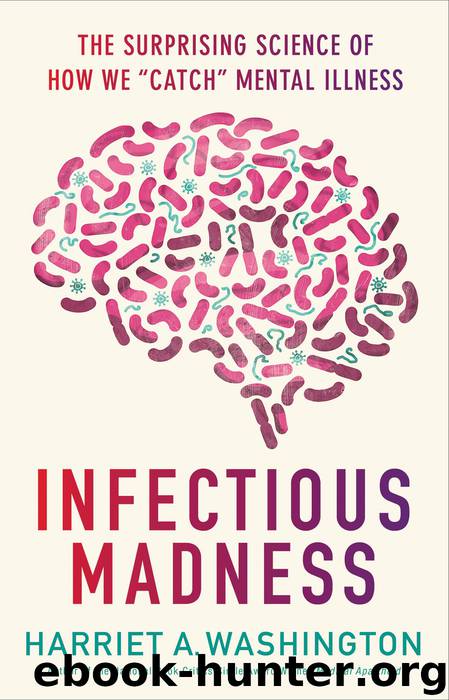Infectious Madness by Harriet A. Washington

Author:Harriet A. Washington
Language: eng
Format: epub
Tags: Medical / Infectious Diseases, Medical / Mental Health
Publisher: Little, Brown and Company
Published: 2015-10-05T16:00:00+00:00
Microbial frenemy
Helicobacter pylori, found in 90 percent of people with ulcers and stomach cancers, wreaks even greater havoc when it escapes from the gut. According to a report in Psychosomatic Medicine, errant H. pylori also contributes to the cognitive impairment of Alzheimer’s disease. People who are infected with H. pylori perform significantly worse on cognitive tests than those who are uninfected, writes the study’s coauthor May Baydoun. Her laboratory found that H. pylori cells travel from the gut to the brain, where the bacterial cells aggregate with the characteristic amyloid proteins of Alzheimer’s and trigger the buildup of plaque. Baydoun, a scientist at the National Institute on Aging, estimates that about 20 percent of people younger than forty and half of adults older than sixty are infected with H. pylori.41
Worse, the bacteria’s effects may not be limited to aging brains; children infected with this ulcer-causing bacteria performed more poorly than controls on IQ tests in a study that suggests a broader link between H. pylori infection and cognitive impairment. H. pylori can be eliminated with antibiotics, which might conceivably lower the incidence or severity of Alzheimer’s, but this is a move to ponder carefully, because the pathogen has beneficial effects as well. The bacteria’s decline coincides with the epidemic of obesity and diabetes in developed countries. Josep Bassaganya-Riera conducted H. pylori studies that suggested this maligned catalyst of ulcers, stomach cancer, and cognitive erosion acted as bacterial armor against obesity. His laboratory at Virginia Tech’s Center for Modeling Immunity to Enteric Pathogens is where, he says, “we demonstrated for the first time that gastric colonization with H. pylori exerts beneficial effects in mouse models of obesity and diabetes.”
Other constituents of the microbiome have positive effects on mood and mental health. Lactobacillus, for example, seems to bestow serenity. Healthy human volunteers who consumed a mix of Lactobacillus helveticus and Bifidobacterium longum exhibited less anxiety and depression, while students’ stools contained fewer lactobacilli during a high-stress exam period than during a less stressful period. These findings suggest an inverse link between stress and lactobacilli that will need to be more fully investigated.
Preparations containing lactobacilli and other probiotic microbes are often touted and sold as health supplements that can improve everything from mood to digestion, but scientists like Ramnik Xavier advise caution. Some of the commercial claims are unproven, warns Xavier, and the microbes may not be helpful when isolated from their companion organisms or when taken by people who do not suffer from leaky-gut syndrome.
One group of investigators scrutinized probiotics to see which, if any, might exploit the benefits of the ENS rather than the credulousness of consumers, and their 2007 report on preliminary human studies, published in the European Journal of Clinical Nutrition, demonstrated that consuming some probiotic strains can improve cognition and mental outlook via the psychotropic influence of lactobacillus and bifidobacterium. In an intriguing grace note, their work mentions why honey is so soothing: kynurenic acid,42 which is produced by intestinal microbiota but also found in honey, is easily
Download
This site does not store any files on its server. We only index and link to content provided by other sites. Please contact the content providers to delete copyright contents if any and email us, we'll remove relevant links or contents immediately.
Periodization Training for Sports by Tudor Bompa(8240)
Why We Sleep: Unlocking the Power of Sleep and Dreams by Matthew Walker(6688)
Paper Towns by Green John(5168)
The Immortal Life of Henrietta Lacks by Rebecca Skloot(4569)
The Sports Rules Book by Human Kinetics(4374)
Dynamic Alignment Through Imagery by Eric Franklin(4201)
ACSM's Complete Guide to Fitness & Health by ACSM(4043)
Kaplan MCAT Organic Chemistry Review: Created for MCAT 2015 (Kaplan Test Prep) by Kaplan(3994)
Livewired by David Eagleman(3757)
Introduction to Kinesiology by Shirl J. Hoffman(3755)
The Death of the Heart by Elizabeth Bowen(3599)
The River of Consciousness by Oliver Sacks(3590)
Alchemy and Alchemists by C. J. S. Thompson(3506)
Bad Pharma by Ben Goldacre(3415)
Descartes' Error by Antonio Damasio(3264)
The Emperor of All Maladies: A Biography of Cancer by Siddhartha Mukherjee(3135)
The Gene: An Intimate History by Siddhartha Mukherjee(3086)
The Fate of Rome: Climate, Disease, and the End of an Empire (The Princeton History of the Ancient World) by Kyle Harper(3050)
Kaplan MCAT Behavioral Sciences Review: Created for MCAT 2015 (Kaplan Test Prep) by Kaplan(2974)
